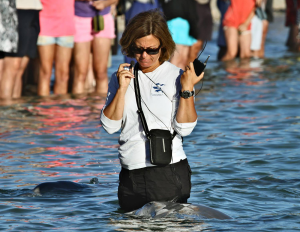
Biology Professor Janet Mann won the Animal Welfare Institute’s Christine Stevens Wildlife Award.
Biology and psychology professor Janet Mann received the Animal Welfare Institute’s Christine Stevens Wildlife Award, a $10,000 grant that will help fund her research on hormone monitoring in cetaceans, an order which includes marine mammals such as dolphins, whales and porpoises.
According to wildlife biologist DJ Schubert, a member of the AWI, a group of judges selected five finalists to receive grants out of a pool of 34 applicants.
“The Christine Stevens Wildlife Award has two areas of focus: one is on the development of humane and non-invasive methods for resolving wildlife conflicts while the second focus is on the development of non-invasive and humane strategies to study wildlife,” Schubert said. “Dr. Mann’s proposal falls into the second category.”
The award, named after the AWI’s late founder and president of over 50 years, honors those whose research aims at developing humane strategies for wildlife conflict management.
Mann’s latest research focuses on measuring the levels of cortisol, a primary stress hormone, detected in the respiratory vapor that is exhaled from a dolphin’s blowhole. Mann is studying the connection between stress and animal illnesses. She conducts much of her research at Shark Bay, a World Heritage Site in Australia, where she has been working for almost 30 years.
“I am very interested in trying to understand why many dolphin populations around the world are suffering .… Off the coast of Virginia last year, a lot of bottlenose dolphins washed up dead and it turned out that it was this disease Morbillivirus which can kill thousands, or even tens of thousands of dolphins a year,” Mann said. “So I am very interested in disease transmission because that can suddenly wipe out a population.”
Chronic stress in cetaceans can be caused by a variety of stimuli, such as pollution, a lack of prey or a loud shipping noise. According to Schubert, most stressors are anthropogenic.
“Collecting stress data on wild dolphins using a non-invasive methodology can provide important information required for the proper conservation and management of dolphin stocks particularly those subjected to anthropogenic impacts and stressors including from cetacean watching activities but also from other forms of recreation, industrial development and ocean noise impacts” Schubert said.
Mann has also worked with the National Aquarium in Baltimore, Md., since 1992. Mann works to collect samples of blow that reveal DNA and hormone levels in cetaceans. The research has encouraged the aquarium to make changes that will lower stress levels in its dolphins; it is considering establishing a dolphin sanctuary and has already stopped its dolphin trick shows.
“The benefits of doing this work is potentially developing a noninvasive stress test for animals in captivity or in aquaria so we could see what we’re doing is not freaking them out,” Mann said. “[We are] applying that to the wild so that we understand our impact on the animals and their environments in addition to their natural stressors.”
Caitlin Karniski (GRD ’19), Mann’s research associate, said that the depth of Mann’s experience in marine biology makes her a good professor.
“What’s really incredible is how well she knows these animals, not just from a species perspective but on an individual level as well,” Karniski said. “Since she has been encountering the same individuals in Shark Bay for almost 30 years now, when she comes across a dolphin on the boat she can instantly know their entire life history, all the important events that have happened throughout their lifetime, she can recall it down to the day.”
Karniski said Mann’s teachings have inspired her to examine this particular field of science in a new light.
“[Mann] and the work she has done has completely opened my eyes up to an entirely new set of questions that you can ask about biology, conservation and evolutionary biology,” Karniski said. “The wealth of knowledge she has is amazing.”
Mann said she hopes her research can help students learn about their impact on the environment and how they can help make changes.
“I feel like this is our planet, and it’s particularly the students’ planet. All the things we have messed up on the planet, you are inheriting,” Mann said. “I think that it’s really important that students are aware of what their impact is on the environment.”




















